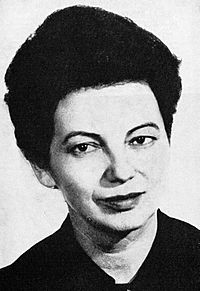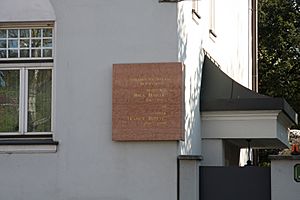Mira Mihelič facts for kids
Quick facts for kids
Mira Mihelič
|
|
|---|---|
 |
|
| Born | 14 July 1912 Split, then Austria-Hungary (now in Croatia) |
| Died | 4 September 1985 (aged 73) Ljubljana, Slovenia |
| Occupation | Writer |
| Nationality | Slovene |
| Notable awards | Sovre Prize 1963 Prešeren Award 1983 |
| Spouse | France Mihelič, painter |
Mira Mihelič, also known as Mira Kramer Puc (born July 14, 1912 – died September 4, 1985), was a famous writer and translator from Yugoslavia. She was known for her interesting novels and for translating many important books into Slovene.
About Mira Mihelič
Mira Mihelič was born in Split on July 14, 1912. At that time, Split was part of Austria-Hungary, but it is now in Croatia. Her birth name was Mira Kramer.
She went to school in Ljubljana, Slovenia. For a short time, she studied law. Later, she decided to become a full-time writer and translator. She became one of the most important Slovene writers of the 20th century.
Mira Mihelič was very active in groups for writers. She was the president of the Slovene Writers' Association. She also led Slovene PEN, which is a part of International PEN. This is a worldwide group that supports writers and freedom of expression. From 1973, she was also the vice-president of International PEN. Thanks to her hard work, international meetings for writers began in Slovenia. These meetings still happen every year. Mira Mihelič passed away in Ljubljana in 1985.
Her Books and Works
Mira Mihelič wrote many interesting novels. Her first novels were Obraz v zrcalu (Face in the Mirror) (1941) and Tiha Voda (Quiet Waters) (1942). These books described a comfortable life with old family traditions.
Soon, she found her own special way of writing. She would show both respect and humor, or excitement and dislike, in her stories. She often wrote about strong, independent modern women. These women were different from their mothers and grandmothers. They wanted emotional happiness and to be free from old traditions.
For example, her 1959 novel April tells the story of a brave woman during the first months of the Second World War. In her books Stolpnica osamelih žensk (1969) and Vrnite se, sinovi (1972), she used even more humor when describing her characters.
Mira Mihelič also wrote historical novels. Tujec v Emoni (1978) is about secrets and plots in ancient Emona (which is now Ljubljana). Cesta dveh cesarjev (1981) is a love story set during the time of the Congress of Laibach. Her last novel, Ure mojih dni (1985), is a memoir, which means it's a story about her own life.
She also wrote books for younger readers, like Pridi, moj mili Ariel (1965) and Puhkova kresna noč (1972).
Awards and Recognition
Mira Mihelič was a very talented translator. In 1963, she received the Sovre Prize. She won this award for translating important books into Slovene. These books included Light in August by William Faulkner, Look Homeward, Angel by Thomas Wolfe, and The Pickwick Papers by Charles Dickens.
In 1983, she won the Prešeren Award. This is a very important award in Slovenia given for a person's lifetime achievements in art and culture.
Mira Mihelič was married to the famous painter France Mihelič.
Selected Works
- April (1959)
- Vrnite se, sinovi (Return, my Sons) (1972)
- Plamen in dim (Flame and Smoke) (1973)
- Pridi, moj mili Ariel (Come, My Gentle Ariel) (1965)
- Tujec v Emoni (A Stranger in Emona) (1978)
- Cesta dveh cesarjev (The Road of Two Emperors) (1981)
- Svet brez sovraštva (A World without Hatred) (1945) play
- Operacija (Operation) (1950) play
- Ure mojih dni (The Hours of my Days) (1985)
 | William L. Dawson |
 | W. E. B. Du Bois |
 | Harry Belafonte |


